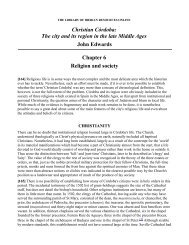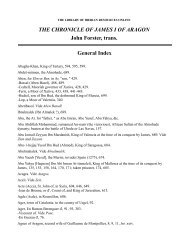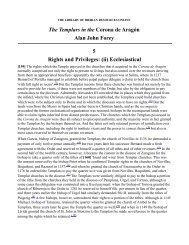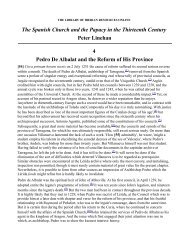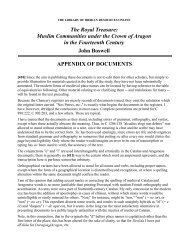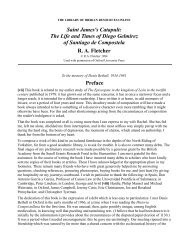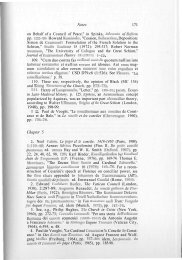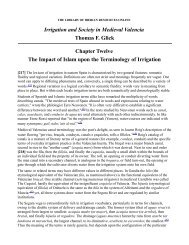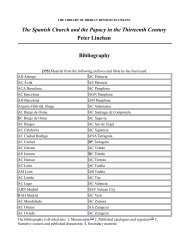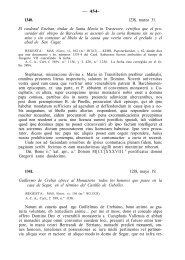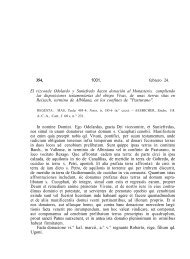PROTESTANTISM - The Library of Iberian Resources Online
PROTESTANTISM - The Library of Iberian Resources Online
PROTESTANTISM - The Library of Iberian Resources Online
Create successful ePaper yourself
Turn your PDF publications into a flip-book with our unique Google optimized e-Paper software.
was soon felt <strong>of</strong> a rigid definition <strong>of</strong> orthodoxy, while the licence which had been good-naturedly<br />
tolerated, so long as it did not threaten the loss <strong>of</strong> power and wealth, became heresy, to be diligently<br />
inquired into and relentlessly punished. Men who esteemed themselves good Catholics, and had no<br />
thought <strong>of</strong> withdrawing from obedience to the Holy See, found themselves accused <strong>of</strong> heresy and liable<br />
to its penalties. Prior to the definitions <strong>of</strong> the Council <strong>of</strong> Trent, there was a certain amount <strong>of</strong> debatable<br />
ground, within which no authoritative decision had as yet rendered the speculations <strong>of</strong> the schoolmen<br />
articles <strong>of</strong> faith. Erasmus, for instance, had not been called to account for asserting that sacramental<br />
confession was not <strong>of</strong> divine law but, as the conflict grew more desperate, and the Church found<br />
defence <strong>of</strong> its outworks to be requisite, it became heretical to question the divine origin <strong>of</strong> confession,<br />
even before the Council had made it de fide. We shall then find the chief sufferers from inquisitorial<br />
action divided into two classes. Before the middle <strong>of</strong> the century they largely consist <strong>of</strong> unconscious<br />
heretics--<strong>of</strong> men who, prior to the condemnation <strong>of</strong> Luther, would have been reckoned as undoubtedly<br />
orthodox. After 1550, with some exceptions, like Carranza, they were those who had knowingly and<br />
[413] consciously embraced more or less <strong>of</strong> the doctrines <strong>of</strong> the Reformation. Outside <strong>of</strong> these another,<br />
and by no means the least numerous class, can be defined <strong>of</strong> those who incurred more or less vehement<br />
suspicion <strong>of</strong> heresy through mere carelessness, in the constantly increasing rigor <strong>of</strong> external<br />
observance. It is doubtless to the first <strong>of</strong> these classes that we may refer the earliest victim <strong>of</strong> so-called<br />
Lutheranism whom I have found recorded--Gonsalvo the Painter <strong>of</strong> Monte Alegre in Murcia, a resident<br />
in Majorca, relaxed, in 1523, by that tribunal as a Lutheran. It is inconceivable that Lutheran errors<br />
could have penetrated at that time to Majorca, or that the inquisitor could have had any clear<br />
conception <strong>of</strong> what they were and, as Gonsalvo is described as a negativo, he doubtless considered<br />
himself a good Catholic and perished because he would not admit himself to be otherwise. (1)<br />
It was not until 1521 that the curia was aroused to the necessity <strong>of</strong> preventing the dissemination in<br />
Spain <strong>of</strong> the new doctrines in the writings <strong>of</strong> Luther. <strong>The</strong> Nuncio Aleander, writing from Worms,<br />
February 18th <strong>of</strong> that year, mentioned that in Flanders Spanish versions <strong>of</strong> Luther's books were in<br />
press, through the efforts <strong>of</strong> the Marrani, and that Charles V had given orders to suppress them. (2)<br />
Acting promptly on this, Leo X, on March 21st, addressed briefs to the Constable and Admiral <strong>of</strong><br />
Castile--the governors in Charles's absence--exhorting them to prevent the introduction <strong>of</strong> such works,<br />
and Cardinal Adrian lost no time in ordering, April 7th, the tribunals to seize all the obnoxious volumes<br />
that they could find, an order which he repeated May 7, 1523, together with instructions to the<br />
corregidors to enforce the surrender <strong>of</strong> the books to the inquisitors. (3) Very earnest letters were also<br />
written, April 12 and 13, 1521, to Charles V, by an assembly <strong>of</strong> grandees, and by the President and<br />
Council <strong>of</strong> State, urging him to adopt strong measures to prevent the spread <strong>of</strong> Lutheranism, which had<br />
been introduced into Spain and threatened to develop. (4)<br />
[414] <strong>The</strong>se may be regarded as measures rather precautionary than called for by existing exigencies.<br />
So far as the records <strong>of</strong> the Inquisition have been searched there is no trace, for some years as yet, <strong>of</strong><br />
prosecutions for Lutheranism, save the solitary case above referred to. With the return <strong>of</strong> Charles to<br />
Spain, in 1522, the influence <strong>of</strong> Erasmus seemed to promise a perpetuation <strong>of</strong> the freedom and even<br />
licence <strong>of</strong> speech, <strong>of</strong> which he was the protagonist. <strong>The</strong> emperor was his admirer and he became the<br />
fashion among courtiers and churchmen pretending to culture. <strong>The</strong> Inquisitor-general Manrique openly<br />
defended him, and so did the primate, Alfonso Fonseca, Archbishop <strong>of</strong> Toledo. His immense reputation,<br />
the immunity conferred on him by the patronage <strong>of</strong> successive popes against the vindictiveness <strong>of</strong> the<br />
religious Orders, provoked by his merciless ridicule, and the futility <strong>of</strong> condemnations by scholastic<br />
faculties, seemed a guarantee for those who merely echoed the opinions to which he had given<br />
currency so wide. So it continued until, in 1527, a translation <strong>of</strong> his Enchiridion was issued by Alonso<br />
Fernández de Madrid, Archdeacon <strong>of</strong> Alcor. It was dedicated to Archbishop Manrique, who had it duly



